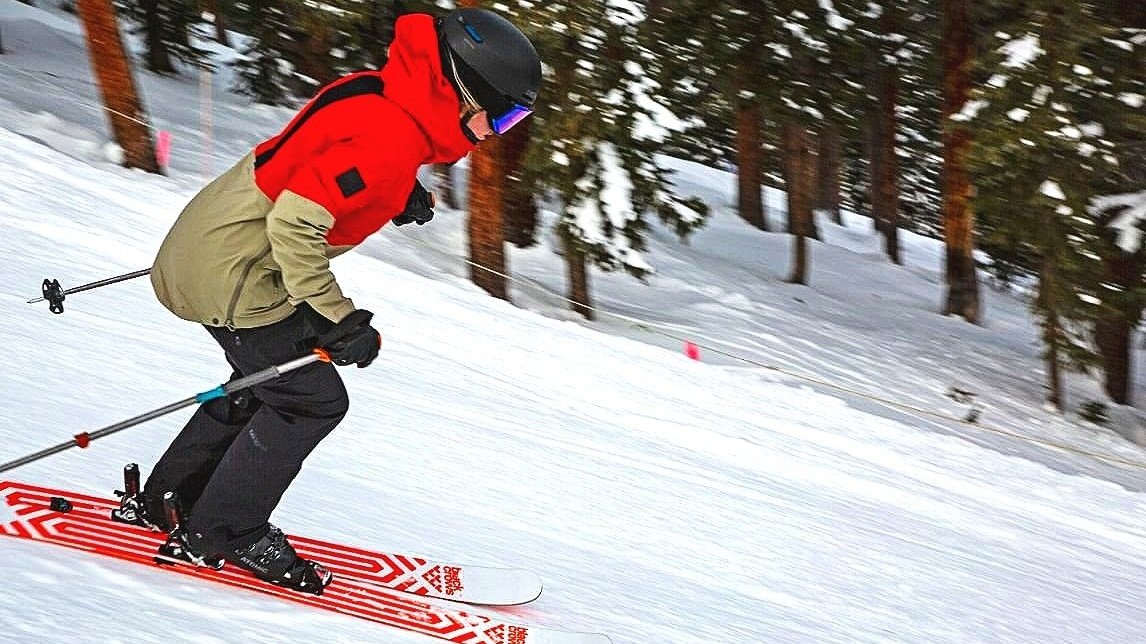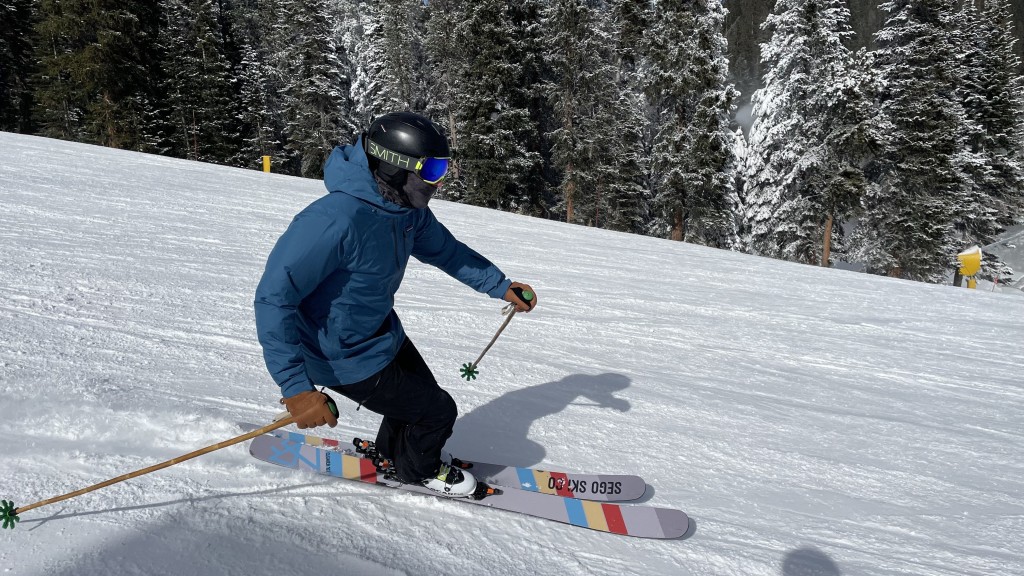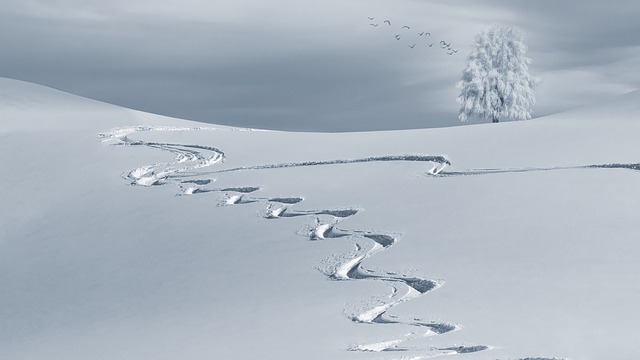
The ski weight refers to the combined weight of a pair skis and bindings. It can affect how the ski performs and if it's appropriate for your needs. It also impacts your ability ski in different snow conditions.
Ski Width
The ski's width affects how easy it can turn and handle different snow conditions. Wider waists allow for easier edge-to–edge turns in powdered or non-grommed skis, and wider waists give better flotation on soft, wet, snow.
Touring Ski Length
The length of a touring skiing ski will determine how fast it can start and maintain turns, especially at speed. The general rule of thumb is that longer skis turn better than shorter ones. This depends on the conditions, the skier's skill level, and how the skier handles them.
Track Setter Dimensions
The cross country ski track settingter dimensions will determine the ease with which your boots can be released from the binding in an event of an accident. The higher the din setting, the more force it takes to release your boot from the binding. This protects your knees as well as your ankles.

Bindings attach to skis and lock your feet in the right place. Track-mounted bindings attach directly to the ski's base. This is the most popular type. Alternatively, drill-mounted bindings, which are fixed with a drilling and gluing process, are used by advanced skiers.
All-mountain and all-telemark skis have track-mounted boundings. These bindings are simple to use. Drill-mounted bindings, on the other hand, are more popular with advanced skiers due to their increased stability and security.
Your Boots are a crucial part of your equipment
A ski boot's flex rating is what determines how flexible it is. While flexing boots with a higher degree of rigidity provide greater leverage and support for turns on steep terrain, they can be more uncomfortable when skiing at high speeds.
These boots have a softer feel and are great for beginners who don't want to spend too much time on the snow. They reduce the strain on your Achilles tendon as well as the muscles in your lower legs.
Boots are also important for preventing injuries in the event of an accident. They are designed to protect your ankle and foot when skiing and to prevent slippage.

How do I measure my skis?
Skis were traditionally measured by length. Today's ski makers use a more scientific approach to measurement, using camber instead of length. This allows you to accurately measure your ski size.
What is the ideal length ski for me?
Beginners should start with a short length. This will make it easier to initiate turns and increase your speed. Intermediate and advanced skiers may prefer a longer length for stability and more float in softer snow.
Do I Need Long Skis?
Although it can be more difficult for longer skis to ski at speed they are also easier to control in different snow conditions. You want skis that are just right for you. Talk to your local retailer about the ideal length skis. They will be able help you choose the best skis for your needs and preferences.
FAQ
Are there any cheap accommodations available for travelers who are traveling abroad?
There are many options for affordable accommodation, including hostels and hotels, guest houses, and bed-&-breakfasts.
Hostels come at a low cost and offer rooms in dormitory-style accommodation where guests share bathrooms with one another.
Hotels are located in tourist areas and offer private rooms with en suite bathrooms.
Hostels have similar features to guesthouses, but they are more spacious and can accommodate fewer guests.
Budget-conscious travelers are increasingly turning to bed & breakfasts. Guests are able to stay in private homes, and they can enjoy a full-service breakfast.
What should you pack for a vacation?
You need to know what you want to do on your holiday. You don't just need to pack clothes. It's also important to think about where you are going, and how long you will be there.
You need to think about what activities you would like to participate in. You might want to go scuba diving if your destination is exotic. You might also want to participate in local festivals and events if you plan to stay longer.
Tell your loved ones if there are any health concerns so they can plan for you.
What can I do to make travelling more enjoyable?
Not all about going from one point to the next. It should encompass all the experiences that are encountered along the journey.
The app "Traveler" was created to help you plan your trip and create itineraries based upon your interests.
We are currently working on adding more features such as booking hotels, flights, renting cars, etc.
This project was created to provide a simple tool to help people plan their travels and make the most of what they have while on vacation.
What can I pack in my bag?
You should always have at least two pairs of shoes. You need one pair for walking in the city; another pair to go on vacation.
Make sure you have enough clothes to cover both. For plane travel, make sure to bring extra socks, underwear, shirt, and pants.
Consider bringing some clothes if you are planning to stay somewhere for a longer time. You won't feel uneasy when shopping for new outfits.
Comfortable shoes are a must if you're going to be taking the train or bus. Also, if driving, bring extra tires.
Also, remember to bring plenty of toiletries, such as shampoo, toothpaste, moisturizer, deodorant and toothpaste.
You'll also need a flashlight and an insect repellent.
It's better to keep all your items in one bag than to try to fit them in different bags. This will save you time and space.
Don't forget to bring a towel and a washcloth. They will be very useful after a long day of sightseeing.
How can you travel light?
There is no right answer when packing for your trip. But here are a few tips to help you choose what to bring along.
-
Only bring what you truly need.
-
Only bring what you plan to actually wear.
-
Avoid buying too many things.
-
Make sure you have room in your suitcase.
-
Double-check everything that you have packed.
-
Take advantage of free storage facilities.
-
Instead of purchasing bottled water, use reusable water bottles.
-
Carry a backpack instead of using a suitcase.
-
Walking or cycling is a better option than using public transport.
-
Select the right bag size
-
Do not carry heavy items.
-
Be ready for anything.
-
Don't leave anything behind
Should I get travel insurance?
Travel insurance is essential if you are planning on doing something adventurous. It is important to have insurance that covers all types of adventure sports.
If you plan on skiing, make sure that you have health insurance. It is also worth looking into coverage for theft, loss and damage.
You should also consider buying cover for cancellation. This allows you to cancel your holiday without having to pay any penalties.
It is also a good idea if you are able to get emergency evacuation cover. You can also be taken off the mountain in the event of an avalanche, or another natural disaster.
Where is the cheapest place to buy airline tickets?
You might want to look at airlines such as Jetstar, Virgin Australia and Tigerair for the best airfares.
If you search online, you will see that some of these airlines give away cheap flight tickets as a promotion.
Statistics
- According to Maori legends, this park holds 14 fjords that were all carved by a giant stonemason with an adze. (busytourist.com)
- No Checked Bags: No Alcoholic beverages with more than 70% alcohol (over 140 proof), including grain alcohol and 151 proof rum. (tsa.gov)
- You can use compression sacs or cubes to reduce the volume of your clothes by up to 80%—this is especially convenient for bulky items such as sweaters and jackets. (eaglecreek.com)
- Alcoholic beverages with more than 24% but not more than 70% alcohol are limited in checked bags to 5 liters (1.3 gallons) per passenger and must be in unopened retail packaging. (tsa.gov)
- Between the ages of 11 and 13, kids, or tweens, will likely want some autonomy but also need boundaries. (travelandleisure.com)
External Links
How To
Which are the best travel tips and tricks for beginners?
It's an exciting time to travel, but there are many dangers you should avoid if your goal is to make it a safe and enjoyable experience.
Here are some basic tips to help you plan your next vacation.
-
Book early. Book early to get lower prices. You can also save money by not taking advantage of last-minute deals offered to you by hotels or airlines.
-
Stay-at-budget accommodations. The best value for money is found in the cheapest hotels. They're usually located near public transportation and shopping centers.
-
Don't overpack. Keep it light. Leave room for souvenirs and gifts. Take clothes that fit well.
-
Use common sense. Don't wander around at night if you are traveling solo. Avoid dark neighborhoods or areas that are prone to crime.
-
Make sure you take preventative measures against theft. Keep valuables out of sight. Swimming is a great way to keep valuables safe.
-
Cash is a dangerous thing. Thieves often target tourists in foreign cities. Keep your money safe and use ATMs only in banks or secured locations.
-
Know what you're doing. Make sure you are familiar with public transportation before booking a hotel. Get information on tourist attractions, restaurants and other sights.
-
Be sure to learn about safety. Learn about local laws, customs, and culture before you arrive.
-
Have fun. No matter what happens, enjoy yourself. It's well worth it.